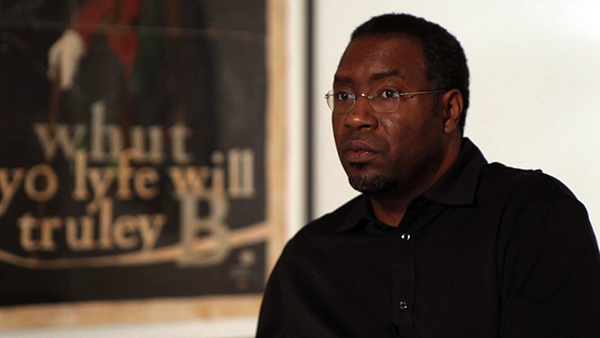A world-renowned contemporary artist is coming to the University of Louisiana at Lafayette.
Michael Ray Charles, recipient of the prestigious Rome Prize, will spend three days on campus. Charles and students in the Department of Visual Arts will collaborate on a limited-edition print. He’ll also present a public lecture that discusses how his art confronts power dynamics, cultural hierarchies and stereotypes.
Charles will work alongside Visual Arts students at Marais Press, UL Lafayette’s printmaking studio, from Wednesday, Oct. 30, through Thursday, Nov. 1., from 9 a.m. to noon and from 1 p.m. to 5 p.m. Marais Press is located in Fletcher Hall, room 301.
The hour-long lecture will begin at 4:30 p.m. Oct. 30 in Fletcher Hall, room 134. Both the printmaking studio and the lecture are open to the public.
Charles is a Lafayette native and a graduate of McNeese State University. He later earned a master of fine arts degree from the University of Houston, where he’s now a professor of painting.
The American Academy in Rome, the oldest American overseas center for research in the arts and humanities, presented Charles its 2018-2019 Rome Prize in Visual Arts. It’s one of the most significant awards a working artist can receive.
Charles was among the first artists profiled in the 2001 premiere of “Art 21,” a PBS series. The previous year, he was a consultant on the Spike Lee film “Bamboozled.”
National and international exhibitions have featured Charles’ work. His graphically styled paintings explore racial stereotypes in American advertising and product packaging, on billboards, and in radio jingles and television commercials.
The Department of Visual Arts’ Marais Press is the only professional printmaking facility on a Louisiana university campus. It has played host to more than 200 artists since 1999, said Brian Kelly. He is a visual arts professor and the printmaking studio’s coordinator.
Kelly said artist visits are an opportunity for students to work alongside professionals who, like Charles, enjoy international acclaim. Artists benefit as well, he said.
“Collaborations provide professional artists with access to current printmaking technology and result in the production of a completed printed edition, while students gain experiences that are marketable in both fine art and commercial printing environments,” Kelly said.
Marais Press teaches traditional printmaking techniques, but it’s more than a classroom. It’s also a lab where research into nontoxic, alternative and computerized printmaking methods takes place.
Print publications and projects produced in the studio have been included in exhibitions and university art collections throughout North and South America, Europe and Asia.
Michael Eble, curator of exhibition and events in the College of the Arts, called Marais Press “a treasure within the Department of Visual Arts.”
“UL Lafayette emphasizes practical research experiences for students,” Eble continued. “By building and maintaining relationships between the University and artistic communities around the world, Marais Press and the printmaking program are helping fulfill that mission.”
Photo caption: Michael Ray Charles (Photo courtesy of University of Houston School of Art)
About the Department of Visual Arts
The Department of Visual Arts is accredited by National Association of Schools of Art and Design (NASAD) and focused on preparing students for careers as professional artists, designers, and art educators. The faculty embraces holistic teaching that integrates art history and critical theory with traditional studio practice and emerging new media.
The department offers concentration in ceramics, computer art and animation, graphic design, metalwork and jewelry, new media and digital art, painting, photography, printmaking, and sculpture. The department also offers, in alliance with the College of Education, a Bachelor of Arts in Art or Music Education K through 12, with a concentration in art education along with minors in art history and studio art for non-majors.
